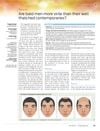Female Pattern Hair Loss, Biological Aging, and the Leiden Longevity Study
September 2016
in “
British Journal of Dermatology
”
female-pattern hair loss FPHL male-pattern hair loss MPHL biomarkers of aging senescence diabetes mellitus heart disease metabolic syndrome polycystic ovarian syndrome hypertension hypercholesterolemia female-pattern baldness male-pattern baldness aging markers diabetes PCOS high blood pressure high cholesterol

TLDR Women with aging signs and heart issues have higher hair loss risk, which may predict shorter lifespan and affect attractiveness.
The Leiden Longevity study found that women with cardiovascular risk factors and biomarkers of aging have an increased risk of female-pattern hair loss (FPHL). More advanced FPHL is associated with additional biomarkers of aging and longevity, suggesting that FPHL is a biological marker of senescence and predictor of reduced longevity. Premature hair loss in both men and women is associated with an increased risk of death overall and in particular from diabetes mellitus and heart disease. Male-pattern hair loss (MPHL) and in particular premature MPHL has a negative impact on reproduction. Female-pattern hair loss normally occurs at or after menopause and signals waning fertility to a prospective mate. Women with premature FPHL appear prematurely aged and may be less sexually attractive. In addition to the psychological problems associated with premature FPHL, affected women appear to have an increased risk of metabolic syndrome, polycystic ovarian syndrome, hypertension, diabetes, and hypercholesterolemia.








